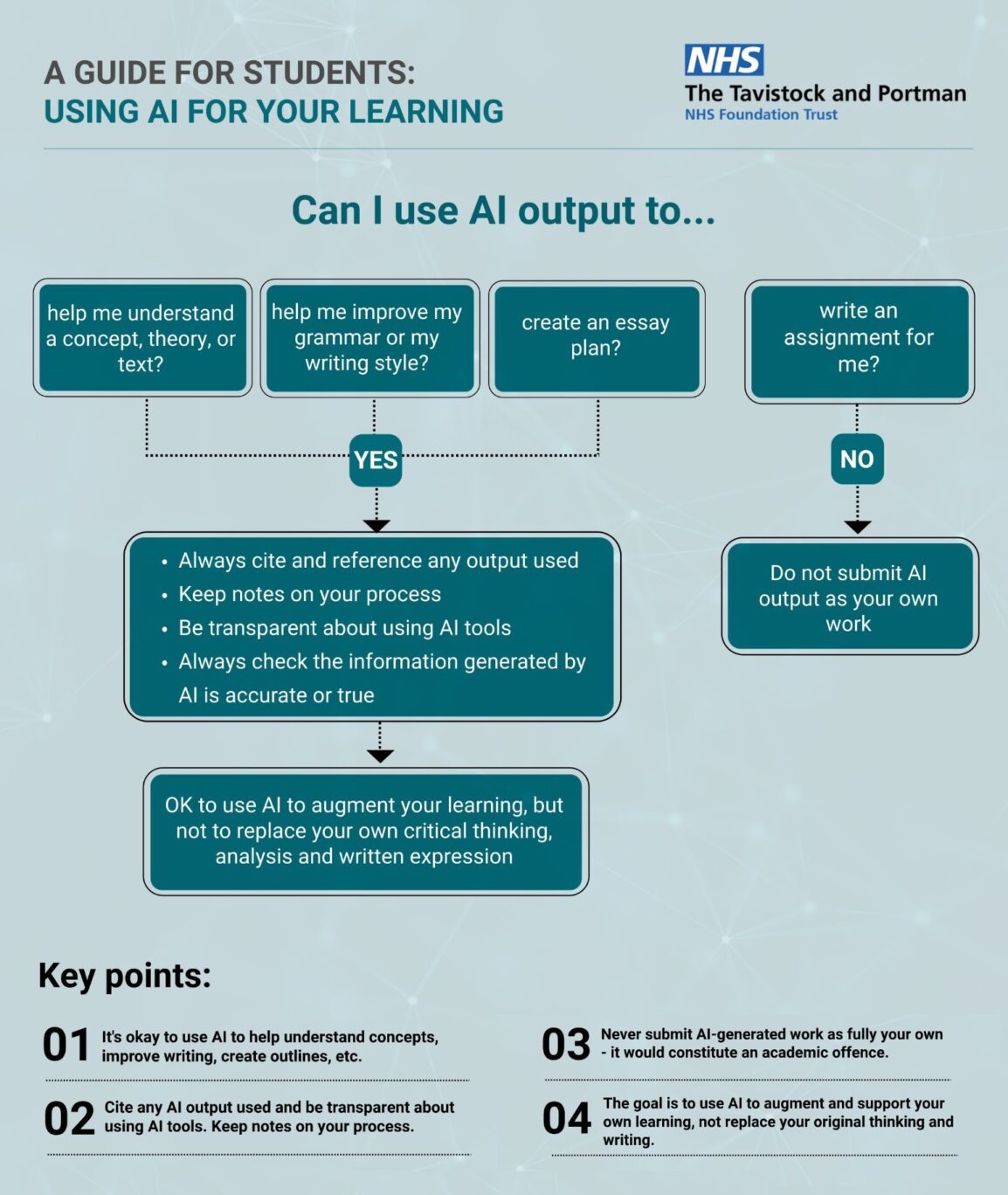Using AI appropriately
Covered in this guide
- General advice before using AI tools
- Using GenAI to help with my learning
- Using AI for assessed work
- What things can I do to make sure I use AI appropriately?
- University of Essex courses
Guidance is applicable to all students and to staff involved in teaching or supporting learning at The Tavistock and Portman.
General advice before using AI tools
Before using Generative AI (GenAI) you should consider:
- when it is appropriate to use a GenAI tool (see below) – there are academic policies on AI use for coursework or research, and you should never try to pass off work written by AI as your own
- GenAI responses are based on historic information and will reflect any biases in the training data
- there are ethical concerns around the use of GenAI
- the instructions you give a GenAI tool (known as prompts) will need to be clear to get the best results, and it can take some experimentation to get something acceptable
- checking the privacy or data settings in any AI tool you use – you may want to turn off any options that let the tool use your work or personal data to train its AI models, as this helps keep your information private and under your control
- GenAI responses are a starting point that will require reviewing – it’s essential that you verify information it produces as you will be responsible if the use of a tool introduces errors to your work.
Remember you should not:
- put private or sensitive information into any AI tools, this includes information about you or any participants in your research or work
- use copyrighted material such as journal articles in GenAI tools
- use GenAI tools as a substitute for searching our library databases and resources – there are limitations in the coverage of the training data
Using GenAI to help with my learning
We encourage you to use GenAI to build an understanding of its strengths and limitations and develop the skills to use AI ethically and effectively.
There is no definitive line between what you can and can’t do. Follow our guidance and use your academic judgment. If you are uncertain, talk to your course lead or lecturer.
GenAI should be used as an assistant to augment rather than replace your intellectual and creative thinking. Here are some examples of appropriate ways you can use AI to help you study:
- reviewing an essay plan to help you develop and improve the structure of your assignment
- reorganising and refining your lecture notes
- improve your grammar or your writing style by looking at how it constructs answers to questions
- asking AI to explain a concept, theory or text that you have had trouble understanding
- discussing a topic to build your understanding of it
- make tasks less challenging if you have additional needs – for example, some AI tools can read text aloud, turn speech into written notes, simplify complex language or provide translations
Never assume the information generated by GenAI is accurate – always review the responses.
Using AI for assessed work
It is important you do not use AI to generate assessed work and submit it as if it were your own work. All the assessed work you submit for your course must be your own.
Writing your own assignments is the only way in which you will develop the skill of communicating effectively in written form. It is also a key pathway for developing your skills more broadly, including the key abilities of developing, formulating, expressing and testing your own ideas.
You will be cheating yourself if you don’t develop those skills by writing your own assignments – whether with or without assistance from digital tools, including AI.

What things can I do to make sure I use AI appropriately?
- be transparent about which GenAI tools you use and how you have used them to create your academic work
- never present AI-generated work as your own in an assignment
- always cite and reference material included in your assignments that is not your own work – use Cite Them Right Online to learn how to cite AI responses
- when you are preparing an assignment, it is a good idea to keep notes that you make along the way and try to keep different versions saved as separate files as your work develops – should you be suspected of committing an academic offence, you will be able to use such notes and archived files to demonstrate how you have constructed the assignment
- never ask AI to generate experimental data which you then submit having purported to have collected it yourself as primary data, either in raw form or after analysis. This is fabrication and counts as academic misconduct
University of Essex courses
The Trust follows the University of Essex procedures regarding academic offences for students on courses that are validated by the University of Essex. If you attempt to pass off AI-generated material as your own work, you will be committing an academic offence.
Under 1.2c of the current Academic Offences Procedures, the following would constitute an academic offence:
“…false authorship or contract cheating, including the soliciting of a third party or the use of artificial intelligence, machine learning or other automated technology, to produce material that is then submitted for assessment and presented as one’s own original work.”
Read the full University of Essex Academic Offences Procedure.
About our guidance
Our guidance is adapted from the University of Essex’s Artificial Intelligence Guidance for Students.